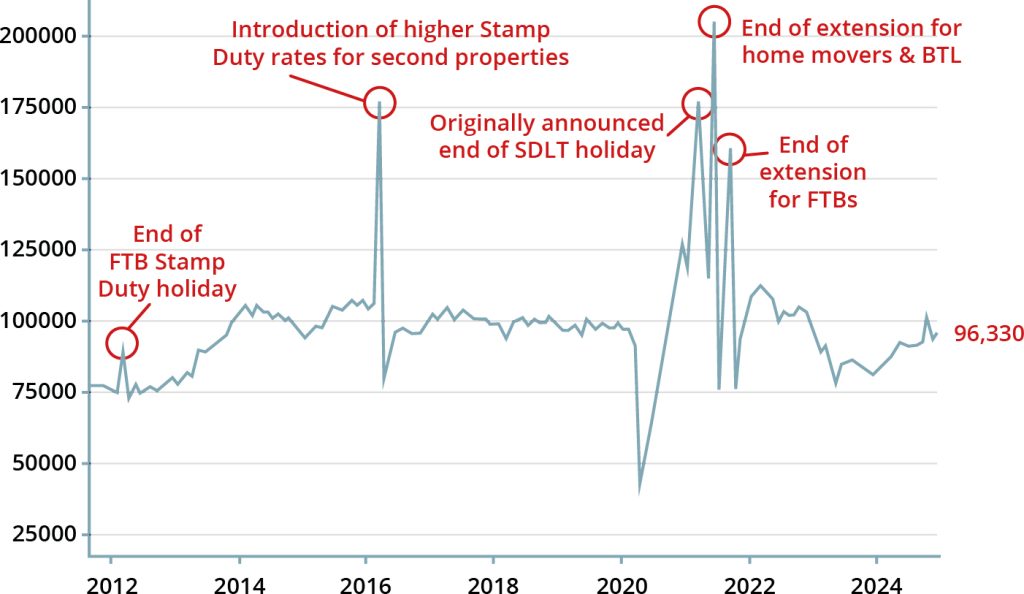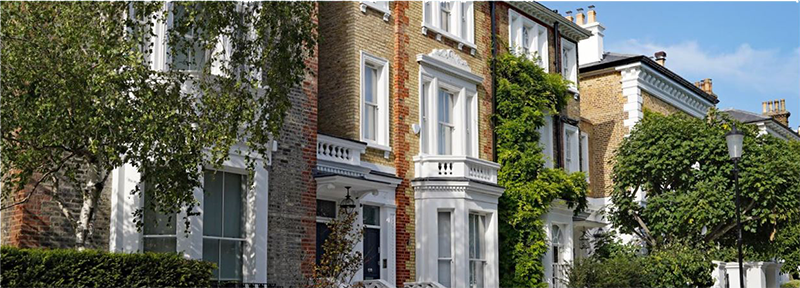Housebuilding falls to seven-year low as planning delays persist
Housebuilding in England has dropped to its lowest level since 2017, excluding the pandemic period, with just 217,911 new homes completed in 2024.
This marks a 6% decline from 2023’s total of 231,000 and continues a four-quarter trend of falling completions, according to Energy Performance Certificate (EPC) data. Completions have slowed across all tenures and builder sizes, though affordable housing has remained relatively stable. Planning delays remain a major obstacle, with 88% of developers citing them as a constraint, according to the Home Builders Federation (HBF).
Beyond delays, the number of homes gaining planning consent remains low. Around 245,000 homes were approved in 2024, in line with 2023, but well below the 370,000 needed annually. While permissions outpaced completions by 12%, the supply gap continues to widen, restricting growth.
Edinburgh retains top spot for residential investment
Edinburgh has kept its position as the UK’s top city for residential investment, according to Colliers’ analysis.
The top four cities – Edinburgh, Glasgow, Manchester and London – were unchanged, while Reading climbed six places to fifth, driven by strong start-up growth and a projected 2.5% annual gross domestic product (GDP) increase. Reading also leads in leisure facilities, making it an attractive investment location.
Andrew White, Colliers’ Head of Residential, said, “After a number of years of turbulence and macroeconomic challenges, it’s interesting for investors to observe that there’s been a period of stability in the UK housing market, with locations that have been sure investments in recent times remaining at the top. The Scottish cities are continuing to top our ranking, most likely due to the affordability and strong economic qualities of the region, as well as the quality-of-life indicators we consider.”
Rental growth slows to lowest level in over three years
The pace of rental growth in the UK has slowed to its lowest level in three-and-a-half years, according to Zoopla.
The average rent for a new let reached £1,284 per month, up 3% from last year, but affordability pressures are keeping increases in check. Zoopla found that while rental market conditions have improved after three years of demand exceeding supply, the shortage of rental homes continues to drive up prices. Rental demand has eased throughout the UK over the past year, with supply increasing everywhere except the West Midlands.
Richard Donnell, Executive Director at Zoopla, said, “Affordability remains the primary constraint on rental inflation, rather than increased supply and greater choice of homes for rent. We expect rents to increase by 3-4% over 2025 as slower growth in large cities is offset by faster growth in more affordable markets.”
UK Monthly Residential Property Transactions
February 2025

Source: GfK UK, Bank of England, HM Revenue & Customs (HMRC)
“Looking ahead, the changes to Stamp Duty at the start of April are likely to generate volatility in transactions in the near term, as buyers bring forward their purchases to avoid the additional tax. This will likely lead to a jump in transactions in March and a corresponding period of weakness in the following months, as occurred in the wake of previous Stamp Duty changes.”
Robert Gardner, Nationwide’s Chief Economist
Source: Nationwide, February 2025
Nearly 74,000 home movers in England set to miss Stamp Duty deadline
Thousands of first-time buyers (FTBs) are set to miss out on the current Stamp Duty savings, with Rightmove estimating more than 25,000 property purchases will complete in April rather than before the 31 March deadline.
From 1 April, the threshold at which FTBs start paying Stamp Duty in England and Northern Ireland will drop from £425,000 to £300,000, while for other buyers, the tax-free band will shrink from £250,000 to £125,000. Rightmove’s analysis, based on properties sold subject to contract and typical transaction timelines, suggests FTBs completing in April rather than March could collectively pay an extra £34m in Stamp Duty.
Rightmove also estimates nearly 74,000 home movers in England will just miss the deadline, leading to an additional £142m in Stamp Duty payments. The south east has been identified as the region most affected by the changes.
“While there’s been talk of a last-minute rush on new mortgages ahead of the changes to Stamp Duty, inevitably we’ve seen some of the demand that was brought forward start to fade as the April deadline ticks closer, given the time needed to complete a purchase. That may help to explain why growth in first-time buyer property prices eased in February, falling to +2.4%, in contrast to homemover price inflation which accelerated, reaching +3.7%. While house price growth has slowed overall, market activity remains strong and comparable to prepandemic levels, demonstrating a resilience amongst buyers that’s been evident in the face of higher borrowing costs.”
Amanda Bryden, Head of Mortgages, Halifax
Source: Halifax, March 2025
Contains HM Land Registry data © Crown copyright and database right. This data is licensed under the Open Government Licence v3.0.
Written and supplied by The Outsourced Marketing Department. All details are correct at the time of writing (19 March 2025)


